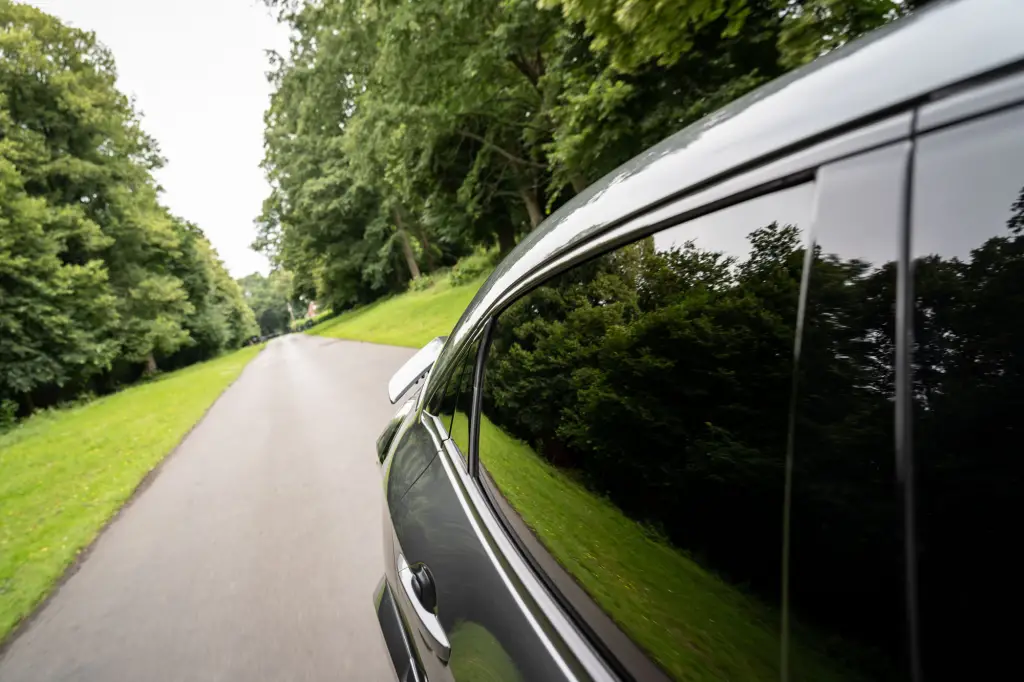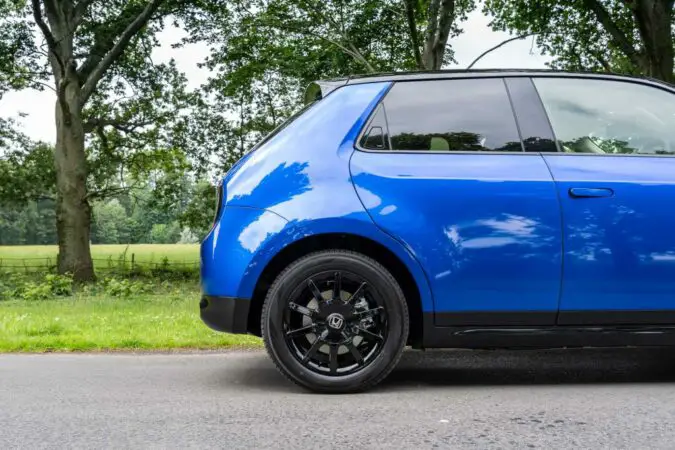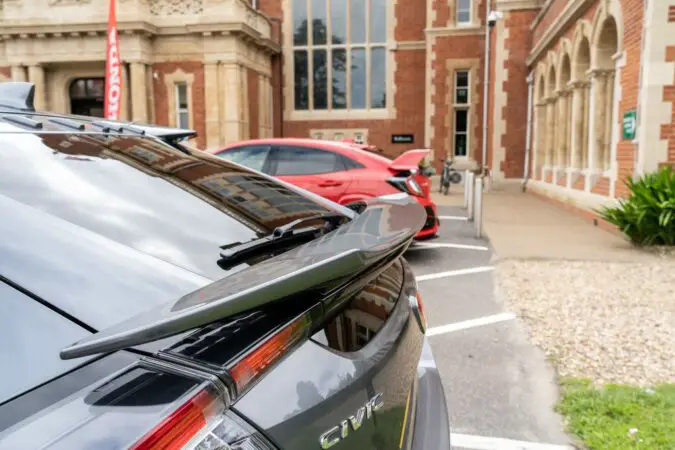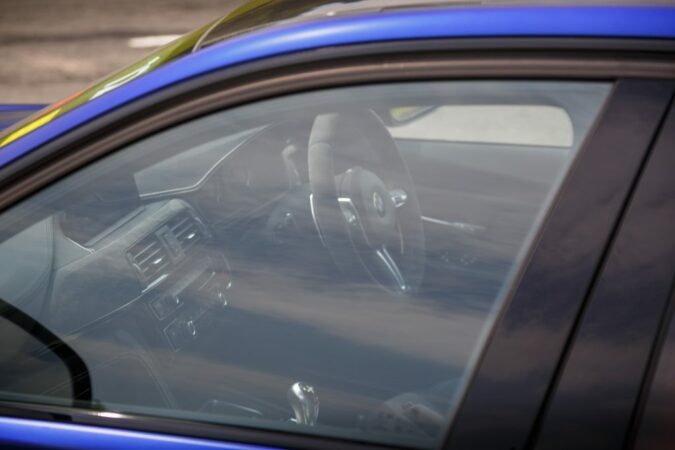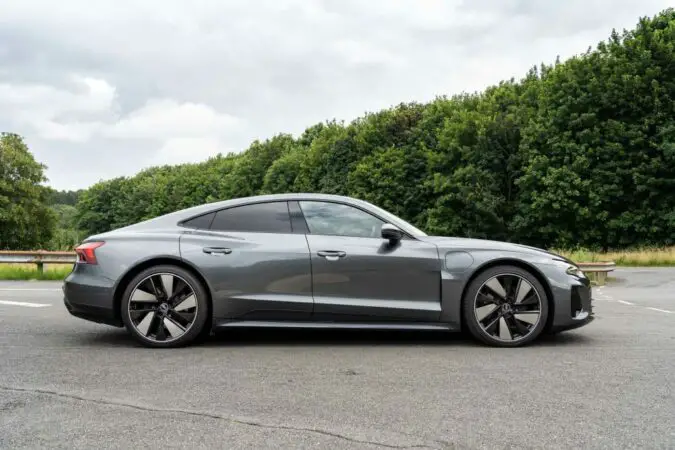As humans, we value our privacy a lot. But as gearheads, we spent a significant amount of our lives driving around in our vehicles. So, how can we protect our privacy when we are out on the road? You see, tinting the windows is one of the best solutions to this concern. However, what’s the legality of this when it comes to cars we do not own outright? Can you tint a lease car? In this article, we’ll answer that exact question.
On top of protecting the privacy of the occupants, tinting car windows have a number of other benefits as well. After going through this article, you will have a clear idea about all of them. Not only that but we will also give you some tips on how to make a leased car your own without getting into hot water with the dealership. So, without further ado, let’s get started, shall we?
Benefits Of Window Tint
Before answering the question “can you tint a lease car?”, you should know what window tint actually is. Actually, window tint is a scratch-resistant layer of film that is pasted onto the glass surfaces of a vehicle.
You might wonder why people tint their car windows. Well, tinted windows offer more than a handful of benefits. Some of the most significant ones are,
- Ensuring Privacy
- Reducing Heat Inside The Cabin
- Shatter Protection
- Blocking UV Rays
- Protecting The Upholstery
- Reducing Glare
- Improving The Looks
- Increasing Resale Value
1. Ensuring Privacy
One of the main reasons you might want to tint the windows of your vehicle is to prevent prying eyes from peeking inside. Not only that, but you can also ensure that your belongings inside the passenger compartment would not receive any unwanted attention when you leave your vehicle parked outside.
As you may already know, window tint is available in a wide variety of shades. Lighter window tint is easier to see through when compared with blackout window tint. However, there are laws that dictate how dark your window tint can get. We’ll talk more about these laws in an upcoming section.
2. Reducing Heat Inside The Cabin
Decreasing the cabin temperature is another great benefit of window tint. This especially comes in handy on those warm summer days. Depending on the shade of window tint you have, it can prevent in the neighborhood of 35 – 65% heat buildup inside the passenger compartment.
The reduction of heat allows the air conditioning system to cool the passenger compartment more efficiently. This will ensure that all your passengers travel in comfort despite the heat outside. Additionally, as the air conditioning is not always on full blast, the window tint will help you to reduce the fuel consumption of your vehicle as well.
3. Shatter Protection
One of the main ways people get injured during a car crash is through shards of shattered glass. Did you know that tinting your windows is a great way to protect yourselves from this danger?
Most window tinting film is designed to prevent the glass from shattering in case of an accident. Additionally, window tint makes it harder for burglars to enter your vehicle by breaking a window as well. To find out more, check out our guide on how to remove car window tint.
4. Blocking UV Rays
The sun emits harmful ultraviolet rays, which are a form of electromagnetic radiation. If you are exposed to these harmful rays long enough, it can result in a whole host of issues like darkening of the skin, premature aging, skin burns, and skin cancer on more severe occasions.
Drivers who are exposed to sunlight during their drives have a high risk of contracting these health issues. Luckily for them, tinting the car windows can block out most of these harmful rays. Even the lightest window film offers some level of protection against UV rays. You can even find clear UV car window tint that is specially designed to protect people from this danger.
5. Protecting The Upholstery
Over time, sunlight can damage your vehicle’s upholstery. This is the same for leather and vinyl interiors alike. With sunlight constantly battering the interior, the leather and vinyl will fade while the interior plastics can crack.
Tinting the windows of a vehicle is one of the best ways to prolong the life of the interior. By blocking the majority of the harsh sunlight entering a car’s interior, window tint can effectively reduce the wear it causes on the interior components.
6. Reducing Glare
If you have ever driven a car in the middle of the day, you know how sun glare can hamper your vision. Tinting the windows is a great way to minimize this issue while simultaneously making driving much safer. This will make driving more comfortable for you, and won’t require you to squint while driving.
7. Improving The Looks
You can’t deny the fact that tinted windows lift the looks of a car to a whole new level. This is especially true when it comes to blackout window tint. So, if you want to make your car look sharper than ever, you know what to do.
8. Increasing Resale Value
As we mentioned earlier, tinted windows help you to preserve your interior. Moreover, it improves the vehicle’s appearance as well. All these factors will play a part when the time comes to sell your vehicle. Buyers will surely be willing to pay top dollar for a sharp-looking vehicle with a well-kept interior.
Now, you know all the benefits that window tint provides. Some of our younger readers won’t have a clear idea of what car leasing is. Coming up next, we will tell you all about leasing a car.
What Is Car Leasing
In a day and age where vehicles have gotten more expensive than ever, leasing one can be one of the best ways to get your hands on a car that you have always dreamt of. In the simplest of terms, leasing a car is similar to renting it for a specific amount of time. On the other hand, when you buy a car, you own it outright until you decide to resell it.
Usually, people can lease a car for a time period between 36 to 48 months. When compared with buying a car outright, leasing gives owners a number of benefits. Some of the most significant ones include,
- Lower Cost
- Ability To Change Cars
- No Maintenance Risks
- Potential For Tax Deductions
- Not Having To Worry About Resale
Benefit #1 – Lower Cost
One of the main advantages of leasing a vehicle instead of buying it is the reduction of costs you’ll otherwise have to pay in purchasing a vehicle. This includes a smaller down payment, as well as lower overall monthly costs. Additionally, leasing allows gearheads to own and enjoy vehicles that will otherwise be out of their reach.
Benefit #2 – Ability To Change Cars
Who doesn’t like to change their ride every few years? Leasing makes this fantasy a reality. When the time period of a lease is up, you can return your current vehicle for a brand-new model. This will ensure that you’ll get the latest in car design and technology fast and cheap.
Benefit #3 – No Maintenance Risks
Maintenance is a headache for most car owners. However, leasing a car eases this burden and helps you keep peace of mind. Most modern cars come with a company warranty that takes care of their maintenance for two to three years. So, if you lease your vehicle for three years, the majority of repairs won’t cost you a penny.
Benefit #4 – Potential For Tax Deductions
Leasing a car can be beneficial when it comes to your taxes as well. So, if you are considering purchasing a vehicle for a business purpose, consider leasing it instead.
Benefit #5 – Not Having To Worry About Resale
Reselling a vehicle can be a hectic experience. But, when you lease a car, all you have to do is to return the vehicle after the agreed period ends. However, be prepared to pay some end-of-lease fees at that point.
However, you should pay attention to some areas before leasing a vehicle as well. These include things like the sale price, time duration of the lease, taxes, and fees, the rent charge as well as the expected mileage.
After going through all these advantages, you might be tempted to lease your next vehicle instead of buying it. But, what about modifications like tinting the windows? Can you tint a leased car? Follow us along to the next section of this article to find out the exact answer to this question.
Tinting Windows On A Leased Car
Whether or not you can tint the windows of a leased car entirely depends on the location where you leased the vehicle from. Some dealerships and manufacturers allow owners to tint the windows, while others don’t.
As we mentioned earlier, you have to adhere to a contract throughout the period of time you own a leased vehicle. In this contract, the lender determines the changes you can make to the vehicle. Going against these guidelines might land you in hot water once the time comes to return the vehicle back to the dealership.
On most occasions, the vehicle should be returned in what is called the “as-leased condition.” In essence, this means that the vehicle should be returned in the condition that it left the dealership, without any alterations or modifications.
The best way to find out whether or not you can tint the windows of your leased car is by directly asking the vehicle lender. Here, we have documented policies implemented by some of the most popular vehicle lenders and manufacturers on tinting the windows of vehicles leased by them. The car makers and lenders we’ll be discussing are,
- BMW
- Tesla
- Toyota
- Nissan
- Honda
- Audi
- Ally Financing
- Chase
- Credit Union Leasing of America
- The U.S. Bank
Can You Tint A Lease Car #1 – BMW
According to the leasing policy of BMW, you’ll have to pay the cost of repairs if the vehicle has any wear and tear at the point of return. Depending on the leasing agreement, tinted windows may also be considered as wear and tear. Other factors like the dealership, make and model of the vehicle also has an effect on the leasing policy
Can You Tint A Lease Car #2 – Tesla
Teslas are some of the best-selling vehicles on the planet right now. Due to their high price, most people tend to lease these luxury electric cars instead of purchasing them. However, the American manufacturer states that owners will be charged for damages caused to the vehicle as a result of unauthorized modifications. This is applicable to window tint as well.
Can You Tint A Lease Car #3 – Toyota
If you are planning of tinting the windows of a leased Toyota, we recommend you check in with the dealership first. We say this because Toyota might charge you extra if you tint the windows without permission.
Can You Tint A Lease Car #4 – Nissan
Nissan has set a number of guidelines with regard to tinting the windows of a leased vehicle. According to this guide, you will be charged if the window tint is fading, peeling, mismatched, or bubbling, or poses a safety risk.
Can You Tint A Lease Car #5 – Honda
Whether or not there are any extra charges for window tint will be determined as part of the end-of-lease inspection.
Can You Tint A Lease Car #6 – Audi
Audi categorizes improperly applied window tint under the excess wear and tear category. If your vehicle is found to have cracked windows as a result of window tint, you will be hit with some extra charges.
Can You Tint A Lease Car #7 – Ally Financing
Ally financing is one of the most popular leased car lenders. They list window tint as an aftermarket alteration that can hand owners additional charges in their lease-end modifications or customizations policy.
Ally financing will hire a third-party inspection company to assess the condition of your vehicle. Generally, this will happen within 5 days of you returning the leased vehicle. If the company finds any issues regarding window tint or any other aspect, you’ll have to pay the penalty charges.
Can You Tint A Lease Car #8 – Chase
According to Chase’s policy, all leased vehicles must be returned in their original condition. So, you have the freedom to tint the windows as long as the vehicle is owned by you. But, you should get the professionally removed when it is time to return the vehicle.
Like other lenders, Chase will conduct a lease-end inspection when you return the vehicle after the agreed period. Failing to remove the window tint before this step will result in additional charges.
Can You Tint A Lease Car #9 – Credit Union Leasing of America
Credit Union Leasing of America (CULA) states in its policy that “All leased vehicles must be returned in the same condition they were when the lease started.” So, you are free to apply window tint as long as you remember to remove it before returning the vehicle.
Can You Tint A Lease Car #10 – U.S. Bank
The auto lease team of the U.S. Bank will thoroughly inspect the leased vehicle as the end of the lease term comes to an end. The organization specifically mentions that no alterations should be done to the leased vehicles. As a result, tinting the windows of a vehicle leased by the U.S. Bank might get you in some trouble.
Legality Of Tinted Windows
On the surface, tinted windows seem like an innocent modification. However, you might be surprised to hear that there are several laws that are concerned with this matter.
The state of California is infamous for its strict laws on vehicle modifications. The same applies to window tint as well. Some of the rules maintained by California on window tint include,
- 75% of light coming from the windscreen should pass through the passenger compartment
- The front side windows should allow 75% sunlight to enter the cabin
However, there are no rules regarding the rear windows or the rear windscreen. Similarly, New Jersey allows the rear windows to be tinted. In contrast to California, the front windows and the windscreen of cars in New Jersey cannot be tinted at all.
How To Apply Window Tint
By now, you must have a clear idea of whether or not you can tint your leased car. But do you know how to apply window tint to your car? As stated earlier, window tint is a thin layer of film that is applied to the windows of a vehicle that offers a whole host of benefits.
Generally, there are two approaches you can take when applying window tint. You can either take your vehicle to a shop that specializes in window tint or if you’re feeling adventurous, do it by yourself.
1. DIY Window Tinting
If you have the necessary tools and skills to tint car windows, doing it by yourself can be a great way to save some money. Be warned, window tinting is not as easy as it looks. Professionals spend years perfecting this craft. So, we recommend trying window tinting on your own vehicle before trying it on a leased car.
To tint the car windows at home, you’ll first have to purchase a roll of window film. Purchasing a window tinting kit that is custom-cut for your specific vehicle can make the process a lot easier. Moreover, you need a dust and dirt-free working area to carry out the window tinting process. A small speck of dust is enough to mess up hours of work.
Speaking of time, we must also mention that tinting the windows at home can take hours, if not days. For more context, check out our explainer on how long does it take to tint windows. On top of that, as you are tinting a leased car, you’ll have to be careful not to damage it as well.
When all is said and done, DIY car tinting at home wouldn’t cost you more than $50. However, you have to question whether the money you save is worth the time and hassle you’ll have to go through.
2. Professional Window Tinting
If you have the funds, we recommend taking your vehicle to a professional to get it tinted. Not only would the job be done perfectly, but you can be assured that the tint will last until the end of your lease as well.
The cost of professional window tinting depends on the size of your vehicle as well as the type of window tint you choose.
Metallic and colored window tints cost more than standard window tint film.
Typically, a shop will charge around $500 to apply standard window film for a small vehicle. Due to their larger size, tinting a large SUV or a van can cost around $1000. Although this might seem rather expensive, we believe the quality of work and time savings justify the cost.
Can You Tint A Lease Car: Final Verdict
“Can you tint a lease car?” is a question that has different answers depending on the organization where you leased the car from. Some lenders have no issues against tinting, while others are strongly against it. Overall, your best option is to have your windows tinted during the lease period and to remove them before returning the vehicle.
Frequently Asked Questions
Can You Tint A Leased Car
Most lenders allow you to tint your car, given that you return it back in its original condition. We recommend clarifying the issue with the dealership before spending money on window tint.
Can You Modify A Leased Car
You can modify a leased car as long as you return it to its original condition when you are returning it. Or else, the company can charge you extra money for breaching the leasing agreement.
How To Tint Windows On A Car By Yourself
Tinting windows on a car by yourself is a great way to save some money. However, it is a time-consuming process. You need tools like a sharp blade, a heat gun, and a squeegee as well as a dust-free space to tint the windows by yourself.
How Much Does It Cost To Remove Tints
If you have time, you can remove window tint by yourself in the comfort of your home. On the other hand, you can get a professional shop to remove the window tint on your car for around $35 per window.
Are Tinted Windows Illegal In NJ
Tinting the front windows and the windshield is illegal in the state of New Jersey. However, you can tint the rear windows without any issues.

